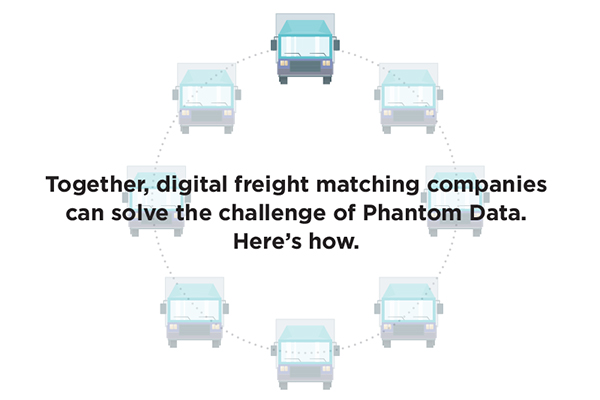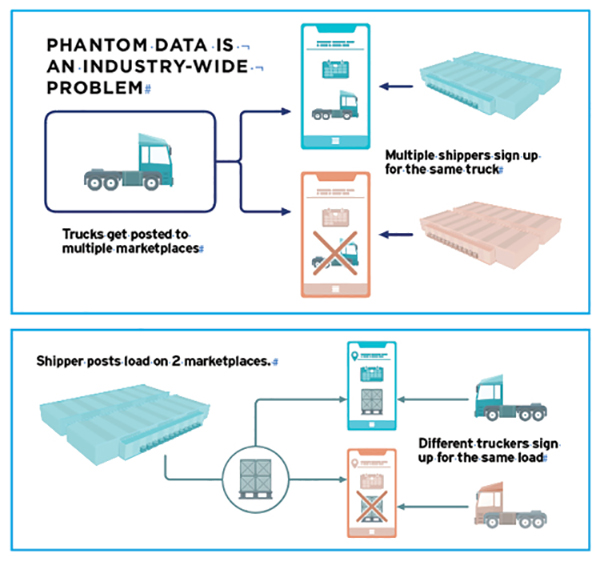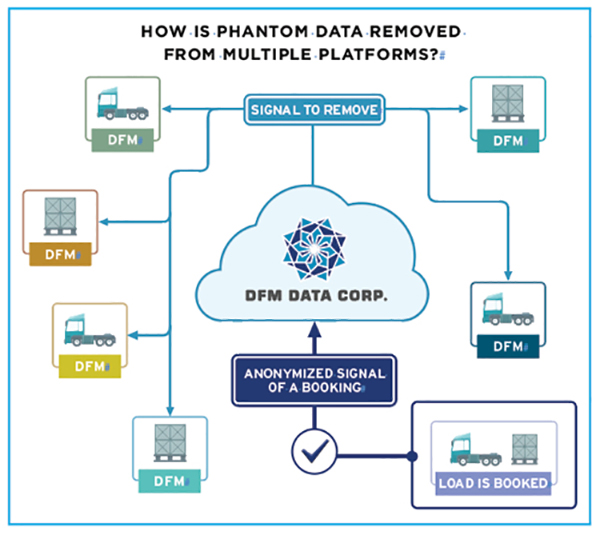Make It Disappear

Learn how digital freight matching companies can work together to solve the unique challenges presented by phantom data.
Digital freight matching—sometimes referred to as “the Uberization of freight” as carriers and shippers connect electronically—is disrupting the traditional freight industry. Digital freight matching accelerates the movement of goods and provides shippers, carriers, brokers, and others with end-to-end shipment visibility. Digital freight matching firms promise to revolutionize the U.S. truckload spot market by capturing and leveraging data to allow all parties to optimize the movement of shipments in ways not possible with traditional freight services.
How Much Does Phantom Data Cost The Industry?
However, before this emerging industry can fully achieve these ambitions, digital freight matching (DFM) must address the unique challenge of “phantom” data, also known as “ghost loads,” among other terms—a data issue that causes confusion, delays, cancellations, and lost productivity.
Today, shippers, carriers, and brokers often post their loads or capacity on multiple freight matching platforms, marketplaces, or load boards. The more carriers that see the loads, the more likely one will be able to book the load—a practice sometimes called “post and pray.” Once a shipper load and a carrier are connected, those loads are effectively off the market.
However, the other participants in the market aren’t aware of this, as no solution is in place for removing those loads from the rest of the market. When DFM providers try to book those phantom loads, they discover, sometimes hours later, that the load they thought they booked was already booked by another company.
Hundreds of thousands of digital freight matches are performed daily. “Phantom freight and ghost loads are huge, expensive problems,” says John Greaves, director, global standards, architecture, conformance, and propagation with Consensus Health and advisor to DFM Data Corp.
Carriers are unable to fully optimize use of their trucks, slowing the movement of freight and adding to its cost. The lack of clean, up-to-date data also hinders automation and limits the ability of participants in the digital freight market to make informed decisions that can better optimize freight movement.
A lack of a shared platform leaves digital freight matching companies with access only to their own data. To fully utilize all drivers and equipment, the industry’s network overall needs to be optimized.
“You can’t sub-optimize hundreds of individual networks or you get incorrect, sub-optimal projections,” says John Larkin, an operating partner with investment firm Clarendon Group and advisor to DFM Data Corp.
Finding a Fix
“The fix for phantom load and capacity data is to have a data clearinghouse that takes a feed from all digital freight matching service providers, and when confirmation of a match is received, they signal all the other DFMs to purge the listing from their platforms,” says Rajat Rajbhandari, Ph.D., chief information officer and co-founder of dexFreight, which is developing an open logistics network for shippers, carriers, and brokers.
One organization is bringing industry participants together and leveraging technology to resolve the challenges posed by phantom data. DFM Data Corp., based in Atlanta, Georgia, is launching a blockchain-based solution that purges phantom data from multiple marketplaces, facilitating frictionless transactions. Because it’s governed by a board of industry members, and participants’ information is secure and anonymized, it can serve as that neutral utility and data clearinghouse for the digital freight industry.
Its role is not unlike the clearinghouses that enable stock markets to process volumes of transactions. NASDAQ, for instance, regularly handles millions of trades each day.
Shippers and carriers routinely post available loads or capacity to multiple marketplaces, apps, load boards and platforms at one time. After the load is booked on one platform, the other platforms still show it as available.
Why Phantom Data Must Go
Removing phantom data from the DFM market will provide compelling benefits. It will further reduce the volume of empty miles, or trucks traveling without freight, Larkin says. This will reduce the environmental impact of trucking and help to mitigate the driver and capacity shortage.
“Just as key, is the information and analysis DFM Data Corp.’s solution can provide,” Larkin says, adding, “digital freight matching firms will differentiate themselves not by having more accurate and cleaner data—although that remains critical—but by how they apply analytics and forecasting to offer greater insight and more accurate projections.”
“The ability to provide information that improves business decisions creates a rising tide that will lift all boats,” says Kurt Wedgwood, U.S. blockchain market executive with IBM. “DFM Data Corp. is providing timeliness of information, taking out costs and making it easy.”
Over the past five years, a few hundred firms that make up the digital freight matching industry have currently penetrated just 3% of the truckload market.
Some DFM firms have used lower prices to try to gain a stronger foothold in the market. In the long run, that strategy is unlikely to be sustainable.
To both achieve profitability and experience lasting, robust growth, they’ll need to address the challenges posed by phantom data so they can improve the efficiency of their operations. That will require a digital freight matching function unencumbered by phantom data—and that requires a clearinghouse.
Tackling Phantom Data Challenges
Bringing DFM firms together and securely distributing the data they hold addresses many of the challenges currently hindering the digital freight market. “The ideal is to have verified participants in the market, entering a valid need, serviced by asset providers with a valid option to move that freight,” says Patrick Duffy, president, BiTA, (Blockchain in Transport Alliance).
Several steps are key to achieving this. First is developing a level of trust between the players and fostering a sense of “co-opetition,” or the recognition that all firms in the industry, including competitors, benefit by working together.
DFM Data Corp. has developed a unique legal structure that encourages co-opetition by allowing accredited member DFMs equity in the organization, a voice on issues, and a vote on decisions.
“No one company can act as the ‘gorilla in the room’ with the clout to sway actions to its benefit,” says Denise McCurdy, Ph.D., an expert in blockchain governance and consultant to DFM Data Corp. “That sense of fair play and the knowledge that all actions are above board is key.” It allows companies to come together and share anonymized transactional information for the good of all firms.
McCurdy also is working with standards bodies, like the Institute of Electrical and Electronics Engineers (IEEE) and BiTA to develop standards that will facilitate the flow of clean, accurate digital freight information. Just as important, DFM Data Corp.’s governance structure is designed to foster compliance with all relevant regulations.
“The technology underpinning DFM Data Corp’s solution is a pure application of blockchain,”says Karen Kilroy, chief executive officer with Kilroy Blockchain, LLC, a provider of blockchain solutions. That is, it enables multiple competitors to work together without compromising their own security.
“Blockchain can ensure all information is anonymized, that only members see data, and then only the data they need to see,” Kilroy adds. “Transactions can’t be changed later. Once the story is there, everyone knows it.”
Providing each shipment with a unique identifier will also help to eliminate phantom loads, she says. Once a load is taken, the identifier will no longer be active.
The concept is simple: When a load and truck are booked by a DFM, software automatically signals the utility, which then signals all the other DFMs to remove the listings from their datasets.
A Visionary Solution
The DFMs and their customers, including 3PLs, shippers, carriers, and others, benefit from DFM Data Corp.’s services. These services are provided for a modest fee per transaction.
“Each DFM uses its own technology to match and track loads,” says Michael Darden, CEO and founder of DFM Data Corp. “Once a load is dynamically matched, our technology receives the record and, in near real time, notifies participating digital freight matching platforms to remove the already booked load or transport capacity data from their platforms.”
The robust capabilities within the DFM Data Corp. solution draw from the breadth of logistics and freight management experience Darden brings to the company. In 2003, Darden was asked to develop a solution that would use the internet to find backhaul opportunities. (Backhaul refers to cargo carried on a truck’s return journey, providing an opportunity to earn additional revenue.)
A Patented Solution
Darden then developed a patented solution that would enable multiple shippers to interface with each other on a web-based platform. Back then, he called the function described in his patent “a dynamic and predictive information system and method for shipping assets and transport.” Today’s shorthand description for the same function is “Digital Freight Matching.” His patent also addresses the purging of duplicated capacity/phantom loads.
“He was able to envision the future before it existed,” says Linda Goetze, president and chief executive officer with the Blockchain Chamber of Commerce.
At the time, however, mobile devices were nowhere near as ubiquitous as they are today. So, Darden waited. By 2018, mobile devices had proliferated—the technology finally catching up with the concept of digital freight matching.
Moreover, the need for Darden’s original solution had become more pronounced. The technology underpinning DFM Data Corp’s solution will enable the industry to “grow faster, better, and more cohesively,” Goetze says.
Because DFM Data Corp. hasn’t taken venture capital or private equity money, it answers only to its members. “Our mission is leading digital freight matching companies to a truly digital future,” Darden says.
And rather than force companies to pay royalties to access his technology, Darden chose to bring all players together to jointly address the problem of phantom data, monetizing the patent by providing value-added services instead. “Michael’s vision is to make all the data available to everyone, and then make it anonymous so companies can’t steal others’ customers,” Larkin says.
“He’s a visionary,” Kilroy says, adding that Darden understands logistics, trucking, digital freight matching and blockchain—all building blocks to developing a solution. “He has the right combination of skills to bring this forward.”
Disrupting Traditional Markets
A more robust and effective digital freight matching market will bring greater disruption to the traditional freight industry. “Digital freight matching firms stand to take market share from more traditional brokers, as DFM technology allows them to handle shipments at less cost, which should enable them to offer more attractive pricing,” Larkin says.
More accurate freight information also may help increase the volume of spot market transactions. With more accurate and timely data available, shippers may be more comfortable with shorter pricing agreements, rather than opting for the safety of longer-term contracts.
DFM Data Corp. has developed its governance and legal structure and is onboarding members. Development of both the software and technical standards is well underway.
This new, more efficient phase in digital freight matching is fast approaching. “Soon, digital freight matching firms will be more efficient and more profitable,” Darden says.
Shippers, pressured by ever-tightening delivery time frames, will increasingly ask whether their digital freight management company is a DFM Data Corp. subscriber, Greaves says.
As digital freight matching becomes more efficient and ubiquitous, the cost savings may lead to “a fully, digitally-connected supply chain,” Goetze predicts. “The numbers are pointing in the direction of digitization, and the DFM Data Corp patent is at the base.”
To be sure, the journey poses challenges. It requires bringing together companies that typically compete and asking them to collaborate within a unique, governance-led business structure. Yet in doing so, all can enjoy faster, more sustainable growth than they would on their own.
“They have the opportunity and the tipping point is right in front of them,” Darden says, adding that “the interoperability our platform facilitates between DFMs also brings potential for other new services and innovations that will further enhance profitability and growth of DFMs.”
For instance, DFM Data Corp envisions facilitating co-brokering between DFMs by enabling the option to make their idle capacity visible to other DFMs. “With the aid of governance and blockchain smart contracts, co-brokered loads can be safe, legal and transparent to all stakeholders—and will provide the shipper a driver-tractor-trailer that truly is the closest available in the market,” Darden says.
Ultimately, the platform will also provide a window into the entire digital freight market. When all DFMs are data-sharing via the DFM Data Corp. platform, Darden says, “it will create the opportunity to leverage a more complete and more timely transactional data profile of the entire market than has even been possible, which will prove to be invaluable to DFMs and their customers.”
How Much Does Phantom Data Cost The Industry?
While every day, virtually all digital freight matching service providers experience significant negative impacts from the presence of Phantom Data in their platforms, there are still no metrics quantifying the real cost to operations. It will take just 5 minutes to participate in a survey designed to quantify the impacts of phantom data on DFMs, shippers, carriers and brokers. The survey probes the frequency of the problem, the time required to recover from delays and cancellations, unhappy customers, lost deals, and more.
SURVEY LINK: http://sgiz.mobi/s3/National-Phantom-Data-Survey-s


